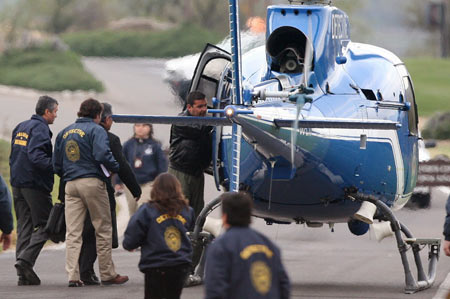Fujimori returns to Peru to face trial
Updated: 2007-09-23 08:23
Lima - Alberto Fujimori returned to Peru on Saturday to face charges of corruption and human rights violations, a grim homecoming for the former president who fled the country seven years ago as his government collapsed in scandal.
The plane carrying the 69-year-old former ruler landed in a heavy mist at Lima's Las Palmas air force base, a day after Chile's Supreme Court authorized his extradition. He was then flown by helicopter to a police base, where he is to be held until a permanent facility is prepared for his detention.
Some 700 supporters who gathered outside the police air terminal across town to greet him were frustated when his plane was diverted to the air base.
"We have come to welcome Fujimori, to tell him that we are with him and will accompany him wherever he goes so that he feels he has the support of his people," said his daughter Keiko Fujimori, who was elected to Congress in 2006.
Fujimori's extradition from Chile has provoked reactions ranging from elation to indignation.
 Former Peruvian President Alberto Fujimori (partially obscured by policeman) walks to a police helicopter in "Hacienda Chiucureo" neighborhood, some 30 km north of Santiago, September 22, 2007. [Reuters] |
A recent poll showed that 23 percent of Peruvians want to see him back in politics and some worry his return could provoke turmoil in a country emerging from decades of political and economic chaos.
"There will be a sector of the country that will identify with him, and he will play a destabilizing opposition role," said congressman Javier Valle Riestra, a leader of President Alan Garcia's Aprista party.
Fujimori was flying to Peru under police custody Saturday, a day after the Chilean Supreme Court ordered his extradition on human rights and corruption charges.
Fujimori's followers and foes alike were stunned in November 2005, when he landed in a small plane in Chile and revealed his ambition to run for president in the 2006 elections, even though Peru's Congress had banned him from seeking public office until 2011. He was promptly arrested.
Fujimori had earned a reputation as a cool-headed strategist in handling multiple crises as president. But he may have miscalculated when he decided to leave his safe refuge in Japan, where he enjoyed immunity from extradition because of his Japanese nationality, inherited from his migrant parents.
It "will be interesting to see how Houdini gets out of this one," said Michael Shifter, a Latin America analyst at the Inter-American Dialogue think tank in Washington.
Fujimori said on the eve of his departure that while his government made mistakes, he has a clear conscience.
"This does not mean that I've been tried, much less convicted. ... I hope that in Peru there exists the due process to clarify the accusations against me," he told the Chilean newspaper El Mercurio.
He noted that while the Chilean Supreme Court authorized his extradition, it significantly reduced the charges for which he can be tried in Peru. According to the extradition treaty between the two countries, he can only be tried on the charges for which the extradition was approved.
Fujimori also suggested that he's eyeing a political comeback, saying, "I still have majority support from a very popular political current.
"I assure you that there will be a political heir if I am no longer around," he added. "There will be a Fujimori movement for a long time. I guarantee that there will be some Fujimori in the next presidential race."
He said his daughter Keiko, who was elected to Congress last year with 600,000 votes, far more than any other legislator, has "what it takes" to be president.
On Friday, Keiko, 32, who is six months pregnant with her first child, demanded that he not be mistreated while in custody and urged supporters to greet him at the airport.
"Fujimori was the one who brought peace to this country, who defeated terrorism, and it seems a paradox that today Fujimori is being tried for human rights," she said.
The Fujimori-allied Congressman Rolando Souza predicted that if the former leader does not receive a fair trial and is sentenced to a long prison term, indignation among his supporters would propel his daughter into the presidency in 2011.
"I'm completely sure of it," he said.
Peruvian prosecutors are seeking 30 years in prison for each human rights charge, and up to 10 years for the corruption charges. But prison terms run concurrently under Peruvian law.
|
|
|
||
|
||
|
|
|
|